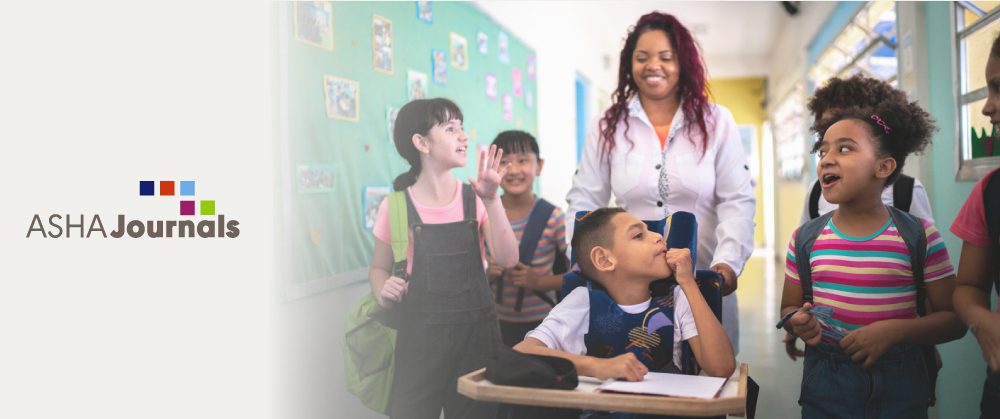For the more than half of all ASHA members working in schools, this is a busy time of year. While you’re settling back into your routine and getting to know your new and returning students, the ASHA journals are here with the latest guidance you need on interventions and assessment for children of all ages.
Below, we’re highlighting articles from all five of ASHA’s journals. These articles offer important tools and inspiration going into a new school year!
Dual Language Learners, Classroom Acoustics, and More
A Reading Comprehension Intervention for Dual Language Learners With Weak Language and Reading Skills: Dual language learners with language impairments require effective intervention to ensure that they have access to the same tools for success as their peers. The intervention studied in this article was shown to be most effective for dual language learners with lower English reading comprehension skills.
The School-Based Speech-Language Pathologist and Students With Concussion: An Examination of Evolving Knowledge and Confidence: Throughout the past decade, a number of significant changes have occurred regarding how concussion management is handled, including in schools. The authors surveyed school-based SLPs on their knowledge of and experience with concussion and discussed the role that SLPs should play on school-based concussion teams.
Inner Speech and Executive Function in Children With Developmental Language Disorder: Implications for Assessment and Intervention: Children with developmental language disorder (DLD) may also have difficulty with executive function. Learn how SLPs can positively encourage executive function by supporting inner speech in children with DLD.
A Review of the Effect of Classroom Sound-Field Amplification on Children in Primary School: School-based audiologists can help children with hearing difficulties succeed in school by advising teachers and administrators on classroom acoustics. This article reviews existing research on sound-field amplification systems and how they can help students hear the teacher’s voice; the article also discusses the limitations of these systems.
Interprofessional Practice
Tutorial: Data Collection and Documentation Strategies for Speech-Language Pathologist/Speech-Language Pathology Assistant Teams: This tutorial shows how speech-language pathology assistants (SLPAs) can perform data collection, documentation, and other administrative tasks, freeing up school-based SLPs to help more students. By performing these tasks, SLPAs can make time for school-based practitioners to serve more students.
Practice-Based Coaching for Speech-Language Pathologists Supporting Paraeducators and Speech-Language Pathology Assistants: When SLPs supervise a paraeducator or an SLPA, this individual often has more direct time with the child, although they have less training and less access to evidence-based practice. Practice-based coaching can help busy SLPs support SLPAs and paraeducators who may not have access to professional development to enhance their skill set.
Vocabulary Outcomes With Third Graders in a Teacher and Speech-Language Pathologist Collaboration: By collaborating with SLPs, teachers can deliver effective vocabulary interventions in the classroom. Learn how SLPs and teachers worked together to deliver paired vocabulary instruction, and how empirical research on the effectiveness of this type of collaboration is much needed in the sciences.
Even More for School-Based ASHA Members
Language, Speech, and Hearing Services in Schools (LSHSS) is ASHA’s journal dedicated exclusively to school-based audiologists and SLPs. Check out the latest issue, or read more than 50 years of work in the archive.
You can also check out thousands of articles from all five ASHA journals on our School-Based Settings topic page! Be sure to filter by year, other topics, and more to find exactly what you’re looking for.
ASHA members based in schools navigate a wide range of responsibilities in an often-changing environment. We applaud all of the work you do, and we hope that these articles can help you make a difference in your daily work.







